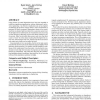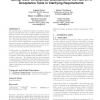686 search results - page 49 / 138 » Empirical Studies in Reverse Engineering |
SOFTVIS
2010
ACM
13 years 7 months ago
2010
ACM
Large clusters of mutual dependence have long been regarded as a problem impeding comprehension, testing, maintenance, and reverse engineering. An effective visualization can aid ...
WCRE
1999
IEEE
14 years 2 months ago
1999
IEEE
As valuable software systems get old, reverse engineering becomes more and more important to the companies that have to maintain the code. Clustering is a key activity in reverse ...
SIGSOFT
2004
ACM
14 years 10 months ago
2004
ACM
Defect-occurrence projection is necessary for the development of methods to mitigate the risks of software defect occurrences. In this paper, we examine user-reported software def...
IWPSE
2007
IEEE
14 years 4 months ago
2007
IEEE
The starting point for software evolution is usually a change request, expressing the new or updated requirements on the delivered system. The requirements specified in a change ...
ASIACRYPT
2000
Springer
14 years 2 months ago
2000
Springer
Since Power Analysis on smart-cards was introduced by Paul Kocher [KJJ98], the validity of the model used for smart-cards has not been given much attention. In this paper, we firs...


